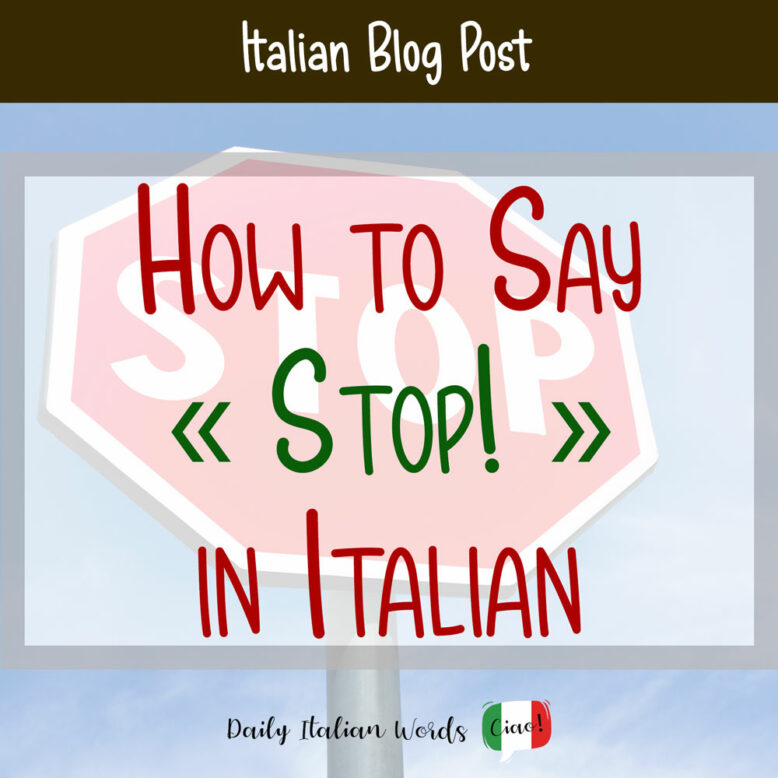If you’re interested in learning how to say “stop” in Italian … fermati qui! Stop here! 😀
There are various synonyms for this word, and as is often the case, some context is required in order to use them properly. For instance, stop signs in Italy normally use the English word stop, but this isn’t a verb in Italian, so don’t even bother using it to translate a sentence such as “Stop the car!”
In this article, we’ve included a list of words that mean “stop” in Italian and the different scenarios in which they are used. We hope you find them useful!

Basta
In order to tell someone to stop doing something, an expression you simply cannot avoid in Italian is « Basta! » We can consider it the equivalent of « Stop it! » in English.
You can use basta on its own, or in conjunction with a verb in its infinitive form if you want to be more specific about the behaviour that requires stopping.
Ho detto basta!
I said stop (it)!
Basta urlare!
Stop yelling!

Smettere / Smetterla
The verb smettere means stop in the sense of ceasing to do something. You can smettere di fumare (to stop smoking) or smettere con la danza (to stop doing dance) for example.
Voglio smettere di fumare.
I want to stop smoking.
Unlike basta, smettere can also be used to form the negative phrase “don’t stop (doing)“.
Non smettere di sognare.
Don’t stop dreaming.
Quite often smettere appears in the company of the feminine pronoun la (smetterla) which stands for a generic quella cosa (that thing). The function of la, in this case, is to add emphasis. Used on its own as a command, it is very similar to « Basta! »
Ma la smetti per favore?
Will you stop please?
Smettila!
Stop it / that!
Piantarla / Finirla / Falla finita
There isn’t much to say about piantarla, finirla and falla finita except that they are all perfect synonyms of smetterla. One can substitute the other three in any sentence. Piantarla comes from piantare (to plant / to abandon), whereas finirla and farla finita come from finire (to finish).
Piantala! / Finiscila! / Falla finita!
Stop that!
Piantala / Finiscila / Falla finita di seguirmi!
Stop following me!

Fermare / Fermarsi
Fermare and the pronominal verb fermarsi mean stop in reference to something that comes to a halt or ceases to move, such as a vehicle or a person walking, or the abrupt end of an ongoing action.
Fermare is used when one subject forces another to stop (e.g. Fermo la macchina = I stop the car) whereas fermarsi is used when someone or something stops of its own accord (e.g. La macchina si ferma = The car stops).
Fermo! Non puoi entrare!
Stop! You can’t come in!
Non ti fermare, vai avanti.
Don’t stop, keep going.
Ferma la macchina!
Stop the car!
Si è fermato in mezzo alla strada.
He stopped in the middle of the road.
It can also mean “stop” in the sense of taking a break or rest (sosta).
Devo fermarmi un attimo.
I need to stop / take a break for a second.
A less commonly used synonym for fermare/fermarsi is arrestare/arrestarsi.

Mettere fine a
Mettere fine a is the word-for-word equivalent of the English “to put an end/stop to” and is used in exactly the same way.
Dobbiamo mettere fine al conflitto.
We need to stop / put an end to the conflict.
Impedire a (qualcuno/qualcosa) di fare
If you want to “stop somebody/something from doing something“, none of the aforementioned verbs will work. Instead you need to use the expression impedire a (qualcuno/qualcosa) di fare (qualcosa) which literally means “to impede/prevent someone/something from doing something“.
La pioggia mi ha impedito di andare.
The rain stopped me from going.
There are, however, three other ways to reword this sentence.
- trattenere (qualcuno) dal fare (qualcosa)
- evitare che (qualcuno) faccia (qualcosa)
- fare in modo che (qualcuno) non faccia (qualcosa)
Mi sono trattenuto dal lamentarmi.
I stopped myself from complaining.
Voglio evitare che il cane distrugga la casa.
I want to stop the dog from destroying the house.
Bisogna fare in modo che non succeda troppo spesso.
We need to stop it from happening too often.
Interrompere
When “stop” means “to interrupt“, you can use the verb interrompere.
Mi interrompi sempre mentre parlo.
You always stop me when I’m speaking.
Bloccare
If you stop something from passing or proceeding, you can use the verb bloccare.
Il portiere ha bloccato il tiro.
The goalkeeper stopped the shot.
Not that in the case of football, Italians also like the verb parare (il portiere ha parato il tiro).
Intasare
Finally we have intasare which means to “stop (up)” in the sense of blocking the passage of something, such as water through a drain.
Un grumo di capelli ha intasato il lavandino.
A clump of hair stopped up the sink.
“Stop” as a noun in Italian
Up until now, we’ve seen how “stop” can be translated as a verb in Italian, but what about the noun “stop“? Interestingly, there are just as many translations for the noun as there are for the verb. Here are a few of the most common terms you will encounter:
- Sosta = “stop” as in a “break” or the “act of stopping” (e.g. una breve sosta = a quick stop)
- Fermata = “stop” as in “a place where one stops” such as a “bus stop” (fermata dell’autobus)
- Tappa = “stop” as in a “stay en-route” (e.g. una tappa a casa di Giorgio = a stop at Giorgio’s house)
- Cessazione = “stop” as in “cessation” (e.g. la cessazione della guerra = a stop to the war)
- Ostruzione = “stop” as in “obstruction” (e.g. un’ostruzione nel tubo = a stop in the pipe)
- Fermo = “stop” as in something that prevents something else from moving (e.g. un fermo per bloccare il macchinario = a stop to block the machine)
- Stop = English calque that means “stop sign” and “break light” in Italian, also used to mean “stop” in the sense of fermare (e.g. intimare lo stop = to tell someone to stop)
- Alt = the equivalent of the English “Halt!“

Heather Broster is a graduate with honours in linguistics from the University of Western Ontario. She is an aspiring polyglot, proficient in English and Italian, as well as Japanese, Welsh, and French to varying degrees of fluency. Originally from Toronto, Heather has resided in various countries, notably Italy for a period of six years. Her primary focus lies in the fields of language acquisition, education, and bilingual instruction.


